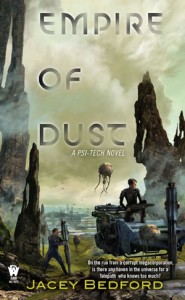My friend and fellow author, the much talented Jacey Bedford, guest blogs about her new book. My reciprocal post is here – Ben
That’s it, I’ve done my best. Empire of Dust is not only finished but it’s published. I have a copy in my hot little hands. Too late now to change a thing.
It’s a star-spanning space opera featuring mega-corporations, brain-implanted psi-techs, foldspace and jump gates. Its broad theme is trust and betrayal with complex relationships and twisty plots. Friends become enemies and help comes from unexpected quarters. The most important skill for survival is knowing where to place your trust.
Much as I’d like to take credit for the whole book, publishing a novel is a team effort. Sure, I wrote it, but my editor, Sheila Gilbert, worked with me to make it better. Then when it was finished to the best of my ability it was handed over to a copy editor who checked it for clunky phrasing, spelling mistakes, continuity errors and consistency, and also translated it from British English into American English. (It’s published by DAW in the USA, a well-established, specialist science fiction and fantasy publisher, part of the Penguin Group.) Then I got it back to do a final check, i.e. the page proofs, which was my first inkling of how it would look in its finished typeset form. After that a professional proof reader went over it yet again.
That’s a huge team effort, but even before DAW agreed to publish it I already owed a lot to members of various critique groups.
Writer Paul Cornell says that it’s a writer’s job to seek out the harshest criticism they can find and learn from it. Some of that learning process comes from reviews after the event, but a wise writer seeks out critique while the work is still in progress. But don’t just ask your mum (unless your mum is a writer, too) and beware of those writers’ groups that exist to pat you on the back just for getting some words down on paper. I’m a firm believer in peer-to-peer critique groups.
There are well-known online critique groups like Critters, but I was lucky to be a part of a Usenet newsgroup called rec.arts.sf.composition (rasfc for short) in the days before Usenet was overtaken by Google groups, blogs and social media. (It’s not all that long ago. Things change quickly in cyberspace and Usenet still exists for those of us who want it.) Someone on rasfc floated the idea of forming an email critique group and a bunch of us who were working hard towards publication waved our hands. It became the RECOG crit group and it lasted for eight years. We had a schedule for submitting work to the group and we were honour bound to give as thorough and constructive critique as we could. I learned a lot from people I knew only by names such as garyfury and zeborah. We were all heartened when one of our number, James Hetley, got his first publishing deal for books that we’d critiqued. Hey, if it could happen for him then there was hope for all of us.
Also on rasfc I met (online) Liz Holliday who was then the secretary of Milford, a week-long event of peer-to-peer, face-to-face critiquing. In order to attend Milford you have to be published, but that need only be one short story to one recognised publisher or magazine. In 1998 I sold my first short story to an anthology and therefore qualified for Milford. I was terrified, but I booked anyway, determined to give it a go. In those days it was held in a cliff-top hotel in Maidencombe (near Torquay). Later it moved to York for a couple of years, and currently resides in scenic North Wales at Trigonos, a lovely residential centre with its own lake and a magnificent view of the mountains.
We were a group of ten in 1998. Writing is a solitary business, so to find nine other like-minded individuals willing and eager to chew over plot-bunnies, story arcs, characters and potential markets gives everyone a real boost, an infusion of enthusiasm and renewed writing energy. My fellow writers included multiply-published American author Patricia Wrede; host of this blog, Ben Jeapes; Cherith Baldry, who is one of the team that writes the very successful Warrior Cats series of children’s books, under the name of Erin Hunter; and Alastair Reynolds and Liz Williams, before either of them got their first book deal.
Did my fellow writers like my book? Not especially, I suspect, though they were very kind in their constructive criticism, and their advice helped me to make changes for the better. They certainly didn’t make me feel like a clueless newbie, even though I was. I learned so much that I went back the following year, and again the year after. In fact, in sixteen years I’ve only missed three Milfords, and those due to prior commitments that I couldn’t shirk. I’ve been on the organising committee for the last five or six years and I now maintain the Milford website.
Each Milford week takes a maximum of fifteen attendees, for both rooming and workload reasons. Attendees submit up to 15,000 words in one or two pieces. These can be complete short stories or sections of a longer work. Days are organised to a schedule in order to make sure all the work is covered. Mornings are free for catching up with any reading and critting not done beforehand. After lunch the formal crit sessions begin, and evenings are for social time (or not; no one need feel obliged if they need to hide away and write like mad).
Milford critiques are thorough but constructive. Each person, in turn, gets four minutes to deliver a verbal crit. The person being critiqued has to sit mute (usually scribbling notes), but then gets an uninterrupted right of reply in which they can scream, ‘But you don’t understand my genius!’ or alternatively explain and clarify ideas. A general conversation ensues in which ideas are developed and searching questions asked, and what began in the crit session can often crop up again at dinner or breakfast, or over a good glass of red in the library late at night.
Lots of good things have happened to me because of Milford, one being the recently formed Northwrite SF writers’ group, started by a few Milford writers who wanted a northern-based quarterly face-to-face group. My fellow Northwriters currently have the pleasure of critiquing chunks of Crossways, my sequel to Empire of Dust, due to be published in 2015.
I can honestly say that if it wasn’t for Milford I would not have a three book deal with DAW and I would not be sitting here clutching Empire of Dust and grinning like an idiot.
Jacey Bedford lives behind a keyboard in Pennine Yorkshire with her songwriter husband, Brian, and a long-haired black German Shepherd dog called Eska. She’s had short stories published on both sides of the Atlantic and her first novel, Empire of Dust, is out from DAW, part of the Penguin Group in the USA, in November. It’s available via good bookshops and the usual online retailers.
Jacey met Ben Jeapes, the host of this blog, at her very first Milford in 1998. She wants to make it very clear that the Ben in her book and Ben-your-blog-host are not related.
- Website: http://www.jaceybedford.co.uk
- Blog: http://jaceybedford.wordpress.com
- Facebook: https://www.facebook.com/jacey.bedford.writer
- Twitter @jaceybedford



Fully support Jacey’s comments on both critiquing groups, either face to face or over email. Plus, Milford writing group is ace. Have attended twice and found the level of support and professionalism outstanding. My writing has certainly benefited hugely.